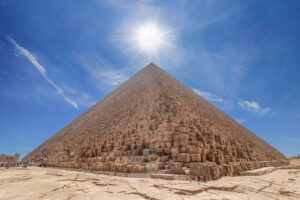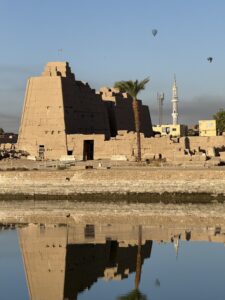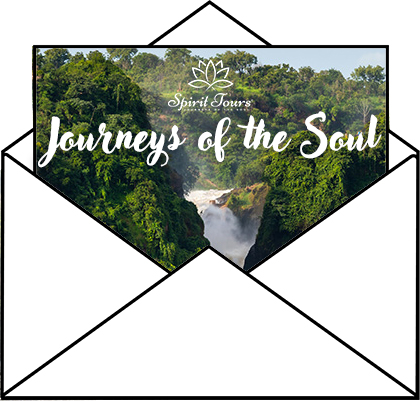
In the complete darkness of the Great Pyramid’s King’s Chamber, silence enveloped our meditation. I felt transported to the moment before my own birth. In this tomb, now become a womb, I was filled with joyful expectation at the prospect of entering the world.
Mine was not the only transcendent experience. One travelling companion would share he felt the walls vibrating. Another heard heavenly chanting the entire time of her meditative state. We emerged to greet the dawn changed, lifted, reconnected to our greater Being. This profound awakening in the heart of Giza was the culmination of a journey that began with a simple invitation from a colleague.
An Unexpected Invitation
Before N’zinga, my university colleague, encouraged me to join her Egyptian tour, I had never really thought about going to Egypt. She said, however, it was not to be missed by anyone interested in the history of African peoples. How true. What I saw on my maiden voyage filled me with pride and wonder. Here I found the undeniable Afrocentric roots of ancient Egypt. After all, Africa is the Motherland to us all, Black, White, Red, Yellow, Brown.
Want more stories like these? Subscribe to our newsletter, Journeys of the Soul, for bimonthly reflections, spiritual travel insights, and first look at new tours.
Standing before Imhotep’s step pyramid at Saqqara, I felt a profound connection. Here was a Black African genius whose mathematical innovations still tower over the desert 4,600 years later. I discovered the progenitors of both humanity and the pyramids were Black. It was the mathematical and architectural genius Imhotep, who designed the first pyramid, the funerary monument of King Djoser at Saqqara. Imhotep crucially introduced the use of stone blocks to supplant mud bricks. King Djoser, a Black African, ruled Egypt from Sinai in the north to Aswan in the south almost five thousand years ago, around 2600 BCE.
As an African American, it was important to learn about the Black rulers of Egypt, such as Queen Hatshepsut (also a pharaoh), Queen Nefertari, King Akhenaten, his son Tutankhamun, and the later Nubian rulers of the 25th Dynasty. Their racial origin, frequently debated, often erased, was evidenced in the miles of statuary, busts, portraits, and other representations found all over Egypt and still being uncovered in Sudan. It is no coincidence. “Egypt’ actually means “Black Land.”
From History to Spirit
Learning about this rich heritage ignited something deeper within me—a hunger not just for historical knowledge, but for spiritual understanding. Upon the invitation to my second trip, I needed no convincing. This time I went to understand the spiritual beliefs of an astoundingly productive and gifted people. What did the ancient Egyptians believe that spurred them to such prolific and artistic achievement?
Dawn Prayers and Silent Seekers
My second journey to Egypt was a Spiritual quest. Spirit Tours was an exceptional fit that set the tone for the 18 of us from my spiritual center. The five daily “calls to prayer” in this Muslim country added to the other-worldly air. The melodic Arabic chants echoing across the land at dawn seemed to awaken something ancient within us all.
Our guide, Rev Karen, prepped us about the early morning excursions (4-5 am!) that would let us have the sacred places to ourselves. First bemoaned, they turned out to be one of the finest aspects of our sojourn. We, a group of silent seekers, saw the sun rise over the Temple of Isis and the mystical Nile. The dark night air was crisp and carried the faint scent of earth and water as our little water boat carried us to the shores of Philae, and then brought us back, transformed, in a blaze of morning sunshine. We greeted dawn virtually alone at the Temple of Hatshepsut, as about 40-50 hot air balloons in the vicinity ascended soundlessly.
Beliefs That Built Egypt
It was with glory and amazement we viewed the stupendous artifacts, and marveled at the sheer number of them that populated our journey from Aswan to Cairo. How could these people be so prolific? So skilled? “Their devotion was total,” Karen explained as we stood before a massive granite statue, her voice hushed with reverence.
Our Egyptologist indicated the answer lay in their beliefs. They believed they were the beloved and divine children of One Creator, “God” in many belief systems, “Ra” in theirs, who rose in the sky every day. All the gods and temples we visited were aspects of Ra, expressed as the heroic Horus, the maternal Isis, the warrior goddess Sekhmet, the god of resurrection Osiris. The whole pantheon of gods were aspects of ourselves, intended to comfort, guide, and inspire. From the body of work produced, it was astonishingly effective.
Floating Through Luxury

Floating up the Nile was a journey of enlightenment and sensory delight. We began our trip in one of the loveliest hotels in Cairo, the Mena House. This lodging, however, paled in comparison to our stay in one of the finest hotels in the world, the renowned Old Cataract Hotel, perched high over the Nile in Aswan. A playground for the moneyed and famous, the hotel bathes its visitors in beauty and luxury. The marble floors felt cool beneath our feet, and panoramic views of the Nile stretched endlessly toward the horizon.
We departed regretfully but next found ourselves in a houseboat built for 20 (and crew of 11), and the lux life of chef-prepared meals, and excursions from the houseboat to all manner of exotic delights. Temples, spice, jewelry, and oil shops, rug weaving schools, villages, and colossi were a small powerboat ride away. The gentle lapping of the Nile against our boat’s hull became our constant companion, while the aroma of exotic spices from the kitchen mingled with the river’s earthy scent. The wonderful Nubian crew of the Afandina treated us to a trip of pampering, camaraderie, and relaxation I am sure even Nerfertiti would relish.
A Divine Encounter at Karnak

The most magical moment of this excursion to the beginning of civilization occurred near the end of the trip. We had wandered Luxor by night, then stood in the glory of Karnak the next day. At Karnak Temple, standing by the huge, Nile-fed Sacred Lake, our tour leader Karen excitedly pointed out an actual falcon sitting atop a tall light tower. “Look!” she whispered urgently, “Do you see it? This is extraordinary!” Fierce birds of prey, falcons are the national symbol of Egypt, represented in the ubiquitous Eye of Horus, and also the logo of Egyptian airlines, appearing on the planes’ tails.
We felt honored, blessed in fact, to have this revered symbol of divine authority, kingship, and connection to the afterlife, show up for our visit. After much oohing and ahhing in homage, we turned to go. At that moment the large bird spread its wings and flew directly over our group in a what seemed a gesture of both greeting and magnificent display. “It’s blessing us,” someone whispered, and we all felt the truth of those words. What a precious gift of interspecies appreciation!
Carrying Egypt Home
Flying back to America, I felt my own land was the foreign and unreal one. What here could endure or inspire as had stone temples and colossal gods? What was so beautiful and so sacred as to compel complete devotion? But after days and then weeks, I resigned myself to my modern life. But not completely. I still long for that different land and carry myself differently, remembering from my King’s Chamber experience how much I wanted to live this life.
The pyramids may stand in Egypt, but their lesson lives within me now—that we are all divine children of creation, capable of building monuments to the eternal through our daily devotion and love.
Visiting a different land is visiting a different way of thinking. Sometimes those visits take you home.
About the Author

Dr. Hazel Spears is a licensed Practitioner of Religious Science whose spiritual journey began as a Nichiren Shoshu Buddhist in Los Angeles in the early 80s, eventually leading her to Founder’s Church of Religious Science where she found teachings that resonated through every part of her being. As a Psychology professor at Cheyney University, a Historically Black University near Philadelphia, she delights in sharing the natural connections between psychological and spiritual life through concepts like learned helplessness, self-fulfilling prophecy, and growth mindsets that affirm our energy-based universe. Dr. Spears is an active member of The Center of Peace in Philadelphia, where she teaches youth, practices her grandmother’s baking traditions, and joyfully pursues spiritual growth among fellow seekers. Her work bridges the academic and spiritual worlds, helping others discover the deeper connections between mind, spirit, and human potential.

Know Someone Who Would Love This, Too?
Refer a friend to join our email community—earn rewards
